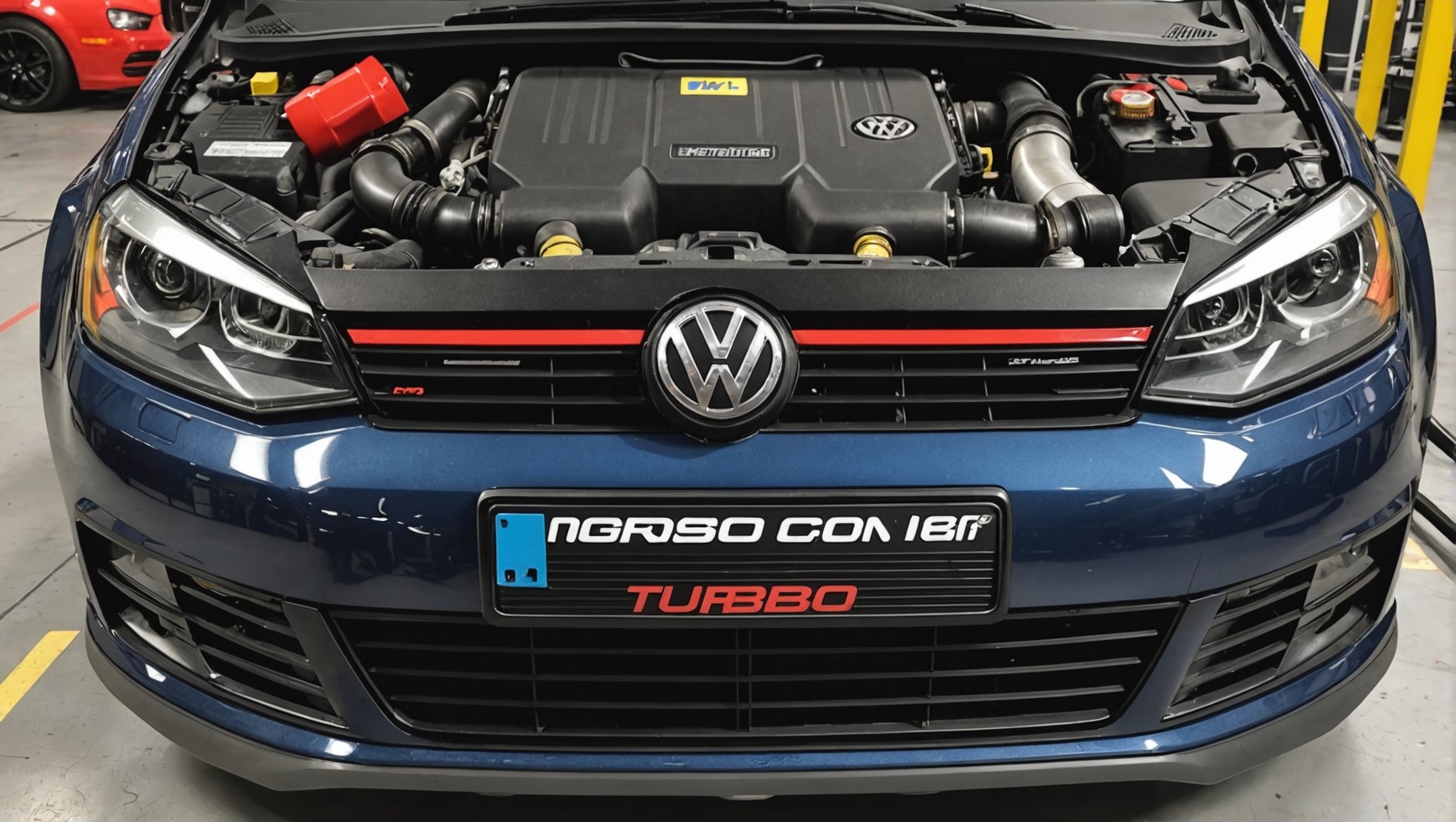Unlocking Turbo Potential: Does Upgrading the Intercooler Boost Efficiency in the VW Golf GTI Mk6?
When it comes to enhancing the performance of your Volkswagen Golf GTI Mk6, one of the most debated topics among enthusiasts is the impact of upgrading the intercooler. The intercooler plays a crucial role in the turbocharged engine’s efficiency, but does replacing the stock intercooler really make a significant difference? Let’s dive into the details to find out.
Understanding the Role of the Intercooler
The intercooler is a vital component in a turbocharged engine, such as the one found in the VW Golf GTI Mk6. Its primary function is to cool down the compressed air produced by the turbocharger before it enters the engine’s intake system. This process is essential because hot air is less dense than cool air, and cooler air contains more oxygen molecules per unit volume, which can significantly boost engine power and efficiency.
Also read : Unlocking Performance: How a Lightweight Driveshaft Can Transform Your Subaru WRX Experience
How the Stock Intercooler Works
The stock intercooler in the VW Golf GTI Mk6 is designed to handle the standard power output of the engine. However, when you start tuning your car for more power, the stock intercooler can become a bottleneck. Here’s why:
- Heat Soak: During high-performance driving, the stock intercooler can quickly become overwhelmed, leading to heat soak. This is when the intercooler itself becomes hot, reducing its ability to cool the air effectively.
- Limited Cooling Capacity: The stock intercooler is sized for the standard engine output and may not have the capacity to handle increased airflow and heat generated by tuning.
Benefits of Upgrading the Intercooler
Upgrading the intercooler can offer several benefits that enhance the overall performance of your VW Golf GTI Mk6.
Also to discover : Unlocking Power: How a Performance Intake Manifold Transforms Your Chevrolet Corvette C7
Improved Cooling Efficiency
A high-performance intercooler is designed to handle higher airflow rates and dissipate heat more efficiently. Here are some key improvements you can expect:
- Better Heat Dissipation: A larger, more efficient intercooler can reduce the temperature of the compressed air significantly, even under heavy load.
- Increased Power: Cooler air means more oxygen molecules entering the engine, which can result in a noticeable increase in power and torque.
Enhanced Engine Reliability
By keeping the intake air cooler, you reduce the stress on the engine. Here’s how:
- Lower Engine Temperatures: Cooler intake air reduces the overall engine temperature, which can extend the lifespan of engine components.
- Reduced Knock and Pinging: Hot air can cause engine knock or pinging, which can be detrimental to the engine. A cooler intake air reduces this risk.
Choosing the Right Intercooler Kit
When selecting an intercooler kit for your VW Golf GTI Mk6, there are several factors to consider.
Key Features to Look For
Here are some key features you should look for in an intercooler kit:
- Core Size and Type: Look for an intercooler with a larger core size and a more efficient core type, such as a bar-and-plate or high-flow core.
- Pipe Kit and Mounting: Ensure the kit includes high-flow boost pipes and proper mounting hardware for a secure and leak-free installation.
- Compatibility: Make sure the intercooler kit is specifically designed for your vehicle, including compatibility with the MQB platform.
Examples of High-Performance Intercooler Kits
Here are a few examples of high-performance intercooler kits available for the VW Golf GTI Mk6:
| Kit | Core Size | Core Type | Boost Pipe Included | Price Range |
|---|---|---|---|---|
| Do88 Intercooler Kit | 550x300x76mm | Bar-and-Plate | Yes | $800-$1,000 |
| AWE Tuning Intercooler | 600x300x76mm | High-Flow | Yes | $900-$1,200 |
| 42 Draft Designs Kit | 500x300x76mm | Bar-and-Plate | Yes | $700-$1,000 |
Installation and Tuning Considerations
Upgrading the intercooler is just one part of the equation; proper installation and tuning are crucial to unlock its full potential.
Installation Tips
Here are some tips to keep in mind during the installation:
- Professional Installation: If you’re not experienced with car modifications, it’s highly recommended to have a professional mechanic install the intercooler kit.
- Ensure Proper Sealing: Make sure all connections are sealed properly to avoid any leaks in the boost system.
- Mounting and Clearance: Ensure the intercooler is mounted securely and has adequate clearance to avoid any damage or obstruction.
Tuning the Engine
After installing the new intercooler, you may need to tune your engine to take full advantage of the upgrade. Here’s why:
- Engine Mapping: The engine’s ECU needs to be remapped to adjust fuel injection and ignition timing to match the cooler intake air.
- Fuel Pump and Fuel System: Depending on the level of tuning, you may also need to upgrade the fuel pump and fuel system to ensure adequate fuel supply.
Real-World Examples and Testimonials
To get a better understanding of the real-world impact of upgrading the intercooler, let’s look at some examples and testimonials.
Performance Gains
Many owners have reported significant performance gains after upgrading their intercoolers. Here’s a quote from a GTI owner who upgraded to a Do88 intercooler kit:
“Since installing the Do88 intercooler kit, I’ve noticed a substantial increase in power and torque. The car feels much more responsive, especially in the higher RPM range.” – John D., GTI Owner
Comparative Testing
In comparative testing, upgraded intercoolers have shown to reduce intake air temperatures significantly. Here’s an example from a test conducted by a tuning shop:
“Our tests showed that the stock intercooler increased intake air temperature by 20°C under heavy load, while the upgraded intercooler kept the temperature within 5°C of ambient temperature.” – Mark S., Tuning Shop Owner
Practical Insights and Actionable Advice
If you’re considering upgrading the intercooler in your VW Golf GTI Mk6, here are some practical insights and actionable advice:
Assess Your Needs
Before upgrading, assess your current setup and driving habits. If you’re not pushing your car to its limits regularly, the stock intercooler might suffice.
Budget and Cost
Upgrading the intercooler can be costly, so it’s important to factor this into your budget. Here’s a rough breakdown of the costs involved:
- Intercooler Kit: $700-$1,200
- Installation: $200-$500
- Tuning: $300-$800
Combining Upgrades
For maximum benefit, consider combining the intercooler upgrade with other performance enhancements such as an air intake system, boost pipe kit, and fuel pump upgrade.
Upgrading the intercooler in your VW Golf GTI Mk6 can be a highly rewarding modification, especially if you’re looking to enhance performance and efficiency. By understanding the role of the intercooler, choosing the right kit, and ensuring proper installation and tuning, you can unlock the full potential of your turbocharged engine.
Final Thoughts
In the words of a seasoned tuner:
“An upgraded intercooler is not just about raw power; it’s about reliability and consistency. It’s a key component in any serious performance build.” – Alex T., Performance Tuner
Whether you’re a casual enthusiast or a serious tuner, upgrading the intercooler is a modification that can significantly boost the performance and efficiency of your VW Golf GTI Mk6. So, if you’re ready to take your car to the next level, consider giving your intercooler the attention it deserves.






